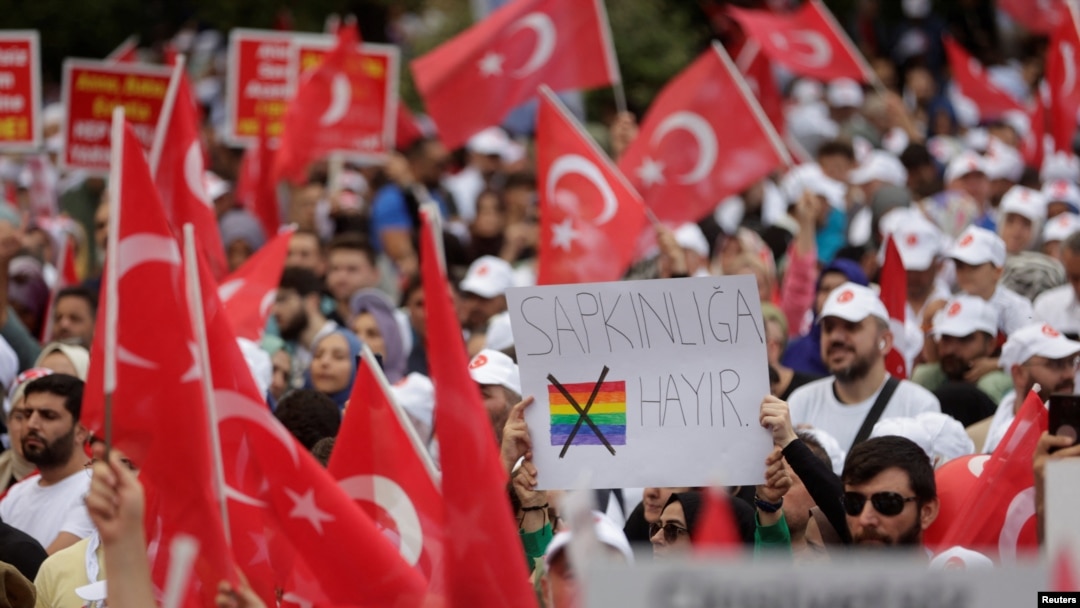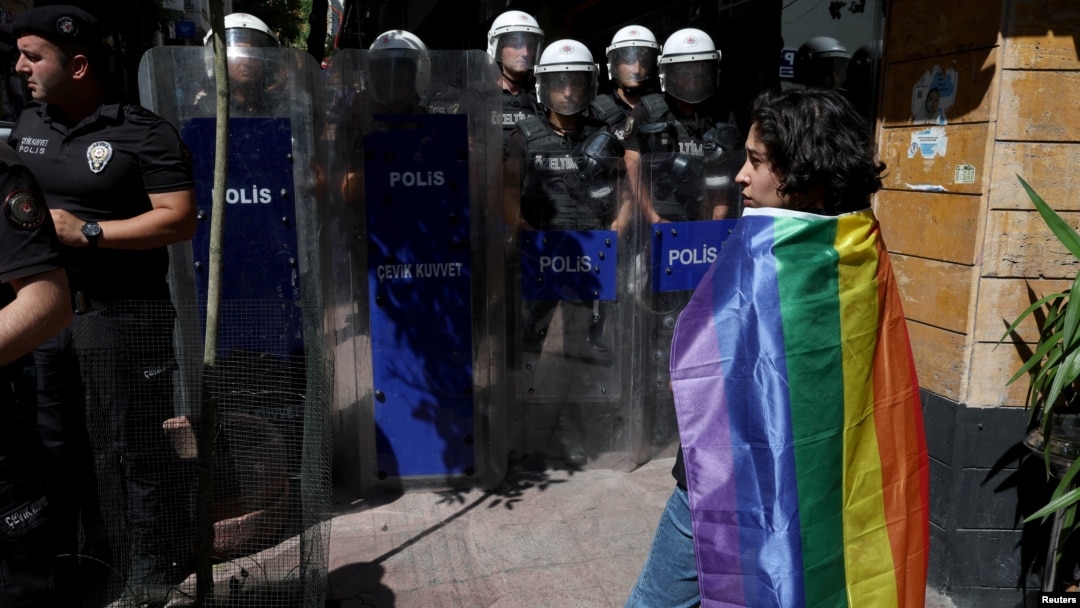For staff at the Turkish LGBTQ online magazine Velvele, the worry that content will be censored is constant.
"That's one of the biggest threats that we might face in the near future," said Ilker Hepkaner, an editor at Velvele. "They might block an essay — or the whole website," he said, referring to Turkish authorities.
President Recep Tayyip Erdogan made attacking the LGBTQ community a focal point of his political agenda in the run-up to his reelection this year, and Ankara has long used internet blocks and legal threats to silence critical outlets.
In an environment that already has a poor media freedom record, questions over whether a journalist may be targeted are "always in your head," Hepkaner said. "But you still continue."
Originally from the city of Izmir, Hepkaner moved to the U.S., where he completed a PhD at New York University. His outlet, founded in 2020, covers news, culture and social issues for LGBTQ audiences in and outside of Turkey.
Even though Velvele has not been censored or threatened with legal action, Hepkaner said that the concern is ever-present. Since a failed attempted coup in 2016, dozens of news outlets have been taken over or forced to shutter.

FILE - A demonstrator holds a placard that reads "No to perversion" during an anti-LGBT rally organized by pro-Islamic NGOs in Istanbul, Sept. 18, 2022.
And, Hepkaner said, the site regularly faces homophobic and transphobic harassment online. Protecting people who write for the site is also a priority, the editor added.
The challenges facing sites like Velvele are a byproduct of bigger forces at play in Turkey.
The lead-up to this spring's presidential election was marked by homophobic and transphobic rhetoric from the ruling government — and especially Erdogan — with pro-government news outlets following suit.
In speeches, Erdogan railed against what he described as "LGBT forces."
"In our culture, family is sacred," Erdogan said in his victory speech in May. "No one can interfere. We will strangle anyone who dares to touch it."
Turkey analysts say the rhetoric was likely an attempt to appeal to the ruling party's ultra-conservative Muslim base and distract voters from Turkey's economic woes.
"The homophobic rhetoric from political leaders, particularly President Erdogan, appears to be mirrored in state media," said Suay Boulougouris, who works on Turkey at the digital rights group Article 19. "This suggests a symbiotic relationship."
Emre Kızılkaya, an Istanbul-based journalist and media researcher, told VOA that the party "may have decided that the LGBTQ+ community can be a convenient scapegoat."
"In order to keep mobilizing public support, especially in the smaller and more conservative heartland of the country, Erdogan's ruling party constantly needs enemies," said Kızılkaya, who is also vice chair of the International Press Institute.
FILE - People are detained during the LGBTQ Pride March in Ankara, Turkey, July 5, 2022.
Presenting the LGBTQ community as a threat to "Turkish family values" may be a political ploy, but it will likely have concrete — and potentially violent — implications for the LGBTQ community in Turkey, according to experts.
Studies on acceptance of gay rights in Turkey show that homophobia is on the rise.
Turkey's Washington embassy and Ministry of Foreign Affairs did not reply to VOA's email requesting comment.
In response to a request for comment, the Turkish Presidency's Directorate of Communications directed VOA to the Ministry of Family and Social Services, which did not reply to VOA's email requesting comment.
In Turkey, homosexuality isn't illegal, and laws exist to prevent discrimination based on sexual orientation. But the country still ranks second to last in Europe in terms of LGBTQ rights, according to an index from the International Lesbian, Gay, Bisexual, Trans and Intersex Association-Europe.
Just last month, a Portuguese man visiting Turkey said he was jailed for 20 days because he "looked gay." Authorities suspected him of trying to take part in an unauthorized LGBTQ parade, media reported. Turkish authorities regularly ban pride parades.
Homophobic and transphobic rhetoric from Erdogan and his allies is "red meat for the core base of conservative, Erdogan voters," said Sinan Ciddi, a fellow on Turkey at the Washington think tank Foundation for Defense of Democracies. "Divisiveness works. Polarization works. He's figured that out."
SEE ALSO: Turkish Regulator Criticized Over Public Service VideoThousands of miles away, Hepkaner said this kind of language still takes an emotional toll.
"Even if you're not doing publishing, you're feeling that anyway. Even if you're living abroad, just reading the news," he said. "I think every LGBTQ person right now, in and from Turkey, is feeling some sort of an emotional toll."
Hepkaner also believes the rhetoric is being used as a distraction from the struggling economy.
Since 2018, Turkey's economy has been beset with high private sector debt, high inflation and high unemployment, according to the World Bank.
"They need to fix the economy, they need to fix the dollar and Turkish lira rate. But instead they are saying the family structure is under attack," Hepkaner said.
In Turkey — where data from watchdogs show that the government controls 90% of the national media — the press plays a considerable role in amplifying that homophobic language.
"The former 'mainstream media' in Turkey has been converted into a propaganda and hate speech machine by Erdogan and his cronies," Kızılkaya said.
And the media space has few independent outlets available to counter that messaging.
While the propaganda may be primarily about votes for Erdogan, it's about much more for Turkey's LGBTQ community. The community for months has been concerned about what an increasingly hostile stance on gay rights will mean.
Under Erdogan's leadership, conservatives have increasingly called for the government to ban what they call LGBTQ "propaganda." Pride parades have been banned and police have at times used violence to disband them. And last year, Erdogan sought a constitutional amendment to "protect" families from what he called "perverse trends" by banning same-sex marriage.
SEE ALSO: Turkey Detains Dozens of LGBTQ Activists During Pride MarchIt's an environment that Hepkaner says makes him fear for his safety when in Turkey.
Marsel Tuğkan Gündoğdu, of the Turkish LGBTQ rights group SPoD, said that the homophobic and transphobic propaganda "can further marginalize and stigmatize the community, leading to increased discrimination, harassment and violence in society."
"It is a very painful situation," said Gündoğdu, who is based in Ankara. "I personally of course worry about my future."
Editor's Note: The fifth paragraph of this article has been corrected to reflect that Ilker Hepkaner has completed his PhD at New York University.


